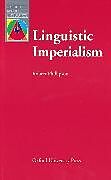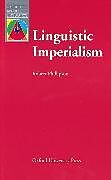Linguistic Imperialism
Einband:
Kartonierter Einband
EAN:
9780194371469
Untertitel:
Englisch
Genre:
Schule & Lernen
Autor:
Robert Phillipson
Herausgeber:
Oxford University Press
Anzahl Seiten:
376
Erscheinungsdatum:
09.04.1992
ISBN:
978-0-19-437146-9
Explores the contemporary phenomenon of English as an international language, and sets out to analyse how and why the language has become so dominant. This book looks at the spread of English historically, at the role it plays in Third World countries, and at the ideologies transmitted through the English language.
'This is an important, groundbreaking study of the political background and impact of the spread of English. Congratulations are due to Phillipson for having taken on this task ... Phillipson has tackled a topic of major proportion and his work shows his wide reading of a large number of interesting sources ... He has drawn attention dramatically to important issues that have so far been mainly ignored and that cry out for continued investigation, and his book should be required reading for all concerned with the development and implementation of language policy.'
Klappentext
This book explores English as an international language, and how and why it has become so dominant.
Inhalt
Acknowledgements
1: ELT: Taking stock of a world commodity
The aims of this book
English for all?
Professional and ethical aspects of ELT 'aid'
Notes
2: English, the dominant language
English in core English-speaking countries
English in periphery-English countries
Language promotion
Opposition to the dominance of English
Notes
3: Linguistic imperialism: theoretical foundations
A cautionary word on terminology
A working definition of English linguistic imperialism
Linguistic imperialism and linguicism
Cultural imperialism in science, the media, and education
The State, hegemony, and ELT
Notes
4: Earlier work relevant to linguistic imperialism
Language spread
The sociology of language
Language planning
Theoretical models of language teaching and learning
Linguistic human rights
Two approaches, Wardhaugh and Calvet
Notes
5: The colonial linguistic inheritance
Their masters' language
Colonial educational language policy and practice
The importance of English as a colonial inheritance
Notes
6: British and American promotion of English
The origins and structure of the British Council
The British strategy for expanding ELT
American promotion of English
Anglo-American collaboration
Notes
7: Creating a profession: the structure and tenets of ELT
Creating a British academic base for ELT
ELT and educational language planning for under-developed countries
Tenet one: English is best taught monolingually
Tenet two: the ideal teacher of English is a native speaker
Tenet three: the earlier English is taught, the better the results
Tenet four: the more English is taught, the better the results
Tenet five: if other languages are used much, standards of English will drop
Conclusions: the legacy of Makerere
Notes
8: English language teaching in action
ELT research
ELT in 'aid' to education
- The overall context of ELT 'aid'
- EFL, ESL or ... ?
- Principles for the analysis of ELT in 'aid'
- Postulate 1: political disconnection
- Postulate 2: narrowly technical training
- English for special and new purposes
Notes
9: Arguments in linguistic imperialist discourse
Types of argument and types of power
English-intrinsic arguments
English-extrinsic arguments
English-functional arguments
The means used to exert linguistic power
Arguments in language planning for Namibia
Notes
10: Linguistic imperialism and ELT
ELT: master-minded?
On the force of the evidence
Studying ELT and imperialism
Notes
Bibliography
Index

Leider konnten wir für diesen Artikel keine Preise ermitteln ...
billigbuch.ch sucht jetzt für Sie die besten Angebote ...
Die aktuellen Verkaufspreise von 6 Onlineshops werden in Realtime abgefragt.
Sie können das gewünschte Produkt anschliessend direkt beim Anbieter Ihrer Wahl bestellen.
Loading...
Die aktuellen Verkaufspreise von 6 Onlineshops werden in Realtime abgefragt.
Sie können das gewünschte Produkt anschliessend direkt beim Anbieter Ihrer Wahl bestellen.
| # | Onlineshop | Preis CHF | Versand CHF | Total CHF | ||
|---|---|---|---|---|---|---|
| 1 | Seller | 0.00 | 0.00 | 0.00 |
